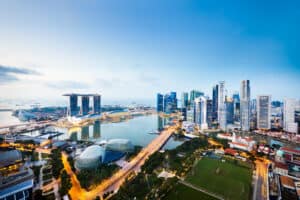As part of a major scheme from the Monetary Authority of Singapore (MAS) to develop the region as a global FX trading hub, several large banks over the last few years agreed to develop FX pricing and trading engines in Singapore, in partnership with MAS.

The initiative saw major banks including Goldman Sachs, JP Morgan, BNP Paribas, BNY Mellon, Deutsche Bank, Barclays and Northern Trust all set up shop in the region.
“One of the key reasons Singapore is an attractive market is it’s pretty well positioned, as it shares the same time zone as Hong Kong,” Gerard Walsh, global head of capital markets client solutions at Northern Trust, told The TRADE.
“There’s already a huge section of the asset management community and the asset servicing community, including Northern Trust, that are established in Singapore as large parts of their global operations.”
Competition
Although Singapore continues to present itself as an attractive market and a potential new major trading hub, competition exists within the region for international engagement.
Hong Kong continues to be very active, with its authorities keen to maintain their hold on the financial services sector. More recently, the UAE also begun to compete within this segment – which wasn’t necessarily the case even five years ago. The UAE also presents time zone benefits – in terms of its closeness to Europe and the UK – for firms which would previously have looked to somewhere like Hong Kong or Singapore to establish an international presence.
“We’ve seen a lot of activity with hedge funds and asset managers establishing themselves in Dubai or Abu Dhabi,” noted Walsh.
“There’s a little bit of regulatory and competitive arbitrage going on in terms of offering up Singapore as a sensible place to base yourself. You’re also seeing the regulators and the industry itself in Singapore react to those by looking for opportunities to attract more and more firms.”
This year, the industry has seen interest in Singapore grow from the buy-side too. Most recently, Legal & General Investment Management (LGIM) expanded its footprint across Asia with the opening of its new Singapore office; the latest development in the firm’s growth strategy for the region.
“Due to the City-State’s regional influence and connectivity worldwide, opening an office in Singapore was an important milestone in LGIM’s international growth strategy,” a LGIM spokesperson told The TRADE. “We consider Singapore one of our most significant investment centres, both in Asia and internationally. It has developed the infrastructure and a stable regulatory and business environment that support accessing South East Asia markets and beyond.”
Elsewhere, interdealer broker TP ICAP also took advantage of the MAS’s initiative to boost the region as a major trading hub. Early last year, TP ICAP revealed plans to launch a foreign exchange electronic trading platform into the region using its Fusion interface.
“With Fusion FX, we are migrating TP ICAP’s various FX products and brands onto platform; it therefore makes strategic sense to launch it in Singapore, given its standing as the third largest FX trading centre globally and the largest in Asia,” Phillip Currie, managing director, e-Solutions at TP ICAP told The TRADE at the time of announcement.
Last year, the London Stock Exchange Group (LSEG) revealed plans to launch a fully-cleared non-deliverable forwards (NDF) matching venue in Singapore, addressing strong demand seen in the region.
Supported by the Monetary Authority of Singapore (MAS), as with the aforementioned FX pricing and trading engines, the roll-out represented the first phase of LSEG’s plans to implement NDF and Spot Matching and streaming relationship venues in Asia.
Positioning the service is Singapore is designed to minimise trading latencies in Asia, with NDF Matching helping push the market towards increased electronification and to offer clearing as a choice at execution, benefiting all participants.
Cross-border exemption framework
As part of its ongoing push, the MAS has also introduced the cross-border exemption framework which has been a key step forward in positioning Singapore as a major trading hub.
The framework allows firms to market their products and services in ways that were previously prohibited unless you had a physical presence and a physical license to do that specific set of activities.
“This enables firms to come in with relationship and business development people to determine whether Singapore is the right place to establish themselves,” added Walsh.
“Singapore offers obvious benefits of getting established in Asia Pacific, putting down a small footprint, and then in a in a relatively low-impact way, hubbing to all of the other places that you might need to visit in the region.”
With a continuous push for attractiveness through various initiatives from the MAS, as well as Singapore’s cross-border exemption framework, it is expected that Singapore will continue to grow as a potential major trading hub over the next few years. With engagement from both the buy- and sell-side, it’s clear that it’s worth keeping our eyes on the region.



